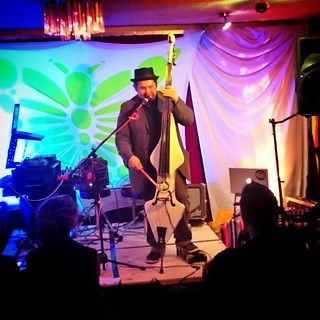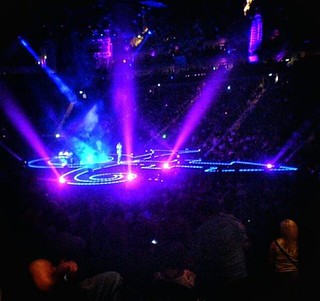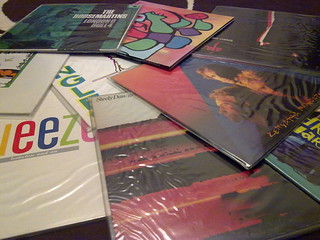_1988_promo_photo.jpg) I’ve mostly given up on writing about people who die. The public mix of heartfelt loss and restrospective hagiography does what it does and doesn’t need my words. My words aren’t needed now either (are they ever?) but it feels like an interesting exercise because Bowie’s presence in the music and cultural landscape of my lifetime was unique.
I’ve mostly given up on writing about people who die. The public mix of heartfelt loss and restrospective hagiography does what it does and doesn’t need my words. My words aren’t needed now either (are they ever?) but it feels like an interesting exercise because Bowie’s presence in the music and cultural landscape of my lifetime was unique.
Unlike an awful lot of music listeners, I’m not particularly in love with Bowie’s 70s work. The canonical, adored, oft quoted stuff. I haven’t even listened to the Berlin Trilogy, beyond the singles. It feels like important work within culture, but it also felt so present in the world that to go and investigate it at this point would be less interesting than looking at almost anything else in the world of music. Confirming either the correctness of the popular take on his work, or my hunch that I’d like it but not enough to fall in line with the mountain of praise heaped on it felt both unnecessary and antagonistic. I don’t like listening to music in order to prove a point. His or mine. [After all, I’m a bloke who plays instrumental music on a bass in people’s living rooms. If I was apt to be shaped by consensus, I’d be in a 5 piece guitar band playing songs with a bunch of white dudes. Probably with beards.]
But, of course, like Dark Side Of The Moon and any number of classic bits of the pop canon that I’ve never given a focused listen to, it’s there in the ether. It’s there in its influence, it’s there in shopping centres – at least the singles are.
I did own Ziggy Stardust, I owned Space Oddity, I owned Pin-ups, i borrowed Scary Monsters and The Man Who Sold The World. I even bought Never Let Me Down and REALLY tried to like it. (Time Will Crawl still makes me smile, and somewhere I’ve got him playing it on TOTP on a VHS tape).
But I bought them as research, as a touchstone for what this massive figure, so oft cited, so ever present on the radio and TV, so beloved… for what he meant.
It wasn’t til Tin Machine that his music really connected with me. I know, Tin Machine, the one that everyone hated. I don’t think I was much aware of the hatred before I bought it. I lived in Berwick On Tweed, so there wasn’t much room to be arch about these things. I bought things based on hunches. and I got the 12″ single of Tin Machine, with a sprawling insane messy live version of Maggie’s Farm on the b-side. THIS was the shit. Listening to Ziggy felt like being part of a club. Listening to Tin Machine felt like an initiation into something far more troubling. It was the point at which – in my world – Bowie stopped being a cultural monolith and instead became an artist about whom there was debate, on whom shitty writers in the pop music press heaped scorn for willfully rejecting the tropes of late 20th century modernist conceit. Tin Machine sold millions of records. MILLIONS. It was a ginormous success in so many ways, but didn’t play the game. That fascinated me. As did everything he did after that. Black Tie White Noise, Outside, Earthling, Heathen, Reality, The Next Day… that’s where my favourite Bowie music lives.
I LOVE that he carried on innovating, behaving like a cultural magpie, absorbing bits of the underground into his work and making it the zeitgeist. There’s probably an interesting conversation to be had about influence vs cultural appropriation, but that’s for someone smarter than me… I love that he worked with such great musicians – he was like Miles Davis (perhaps the only musician of the century with influence on the same scale and across so many worlds? Beatles fans can argue with that if they like 😉 ) in that he could spot genius, and assembled music like ingredients for a recipe – anyone who had Fripp, Belew, Reeves Gabrels, Nile Rogers, Stevie Ray Vaughan and David Torn on guitar is doing fine. Gerry Leonard is another guitar genius. Gail Anne Dorsey is both an exceptional bassist and singer, and while the vast majority of Bowie’s musicians and collaborators were white dudes, he was arguably more open to diversity than most – Nile Rogers was a surprise choice after the Eno collaboration years, and Gail was one of the longest serving members of his band (and sang Freddie Mercury’s part on Under Pressure live!!) …though it surprises me that according to Wikipedia they never wrote together.
So, for me, the magic of Bowie isn’t in Heroes, or Five Years or Let’s Dance. It’s the frailty of The Loneliest Guy, it’s the introspection layered over David Torn’s burbling gentle guitar glitch. It’s Angry, Messy, Shouty Bowie, playing small clubs while having a huge amount of fun, as Reeves waves a guitar shaped wand over the music of Tin Machine, it’s releasing an album chock full of super-hip and super-deep NYC jazzers the day before his death.
So I’m not listening to Heroes today, or Sound And Vision, or Space Oddity… I’ll be listening to Cactus (a Pixies cover! You’ve no idea how great that was to hear when it came out), You Little Wonder, Slip Away, Where Are They Now… Give me 90s and 00s Bowie, Bowie actively ignoring the bullshit around his own legacy and the bloviating about his 70s so-called ‘peak’ and making music that he seemed to care about.
It’s not that they’re better, or have to mean more to anyone else. It’s that when the world hands you a Bowie-sized set of material – musical, historical, cultural, fashion, media, film, and a dialog with meaning through artifice – everyone gets to tell their own story. David Bowie is Lego – there’s a normalised way to assemble the pieces, a recognised big story to it, but everyone gets to pull it apart and build their models, tell their own story, construct their own launch pad for inspiration.
I have a number of friends who worked with him. All had a deeply complex relationship with him and the machine around him. You can’t engage with something like that as equals. That’s both fucked up and inevitable. That he wrestled with it better than many is of note, but also it’s part of why the notion that we may never see his like again doesn’t sadden me. He was him, we are now, and it’s all good. No-one needs to make hundeds of millions of pounds out of music, no-one needs to be a global megastar. Given that the affordance existed for that to happen, I’m glad that we had David Bowie as part of that absurdity. But the seduction of bigness is the most mundane, meaningless part of what Bowie meant, for me. That was the story before he interested me. Fighting that, making work in spite of it and the pressure it brought is where his vitality lay.
I’m not sad because a legend is gone. His music’s still there, and it’s unlikely I’d ever have met him. I’m sad because in the same week that Pierre Boulez died at the age of 90, we’re robbed of another couple of decades of Bowie fucking with our heads, doing infuriating stuff, making great music and making misunderstood music, disappearing for years and then changing his mind and being a monumentally huge and pervasive influence without being a dead icon. That’s rare. Like, once in history rare.
The temptation is to write some kind of personalised send off, addressed to the departed, but that wouldn’t mean much, because I didn’t feel close to him. I wrestled with his work, I love that it made me think, that at times I wanted to not like it and ended up loving it, and the opposite was also true. I like that music was enough. And I still have that. So for that, I’m deeply grateful.
 “All of the magic in the world is leaving”
“All of the magic in the world is leaving”


_1988_promo_photo.jpg)